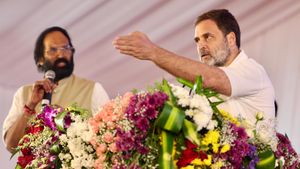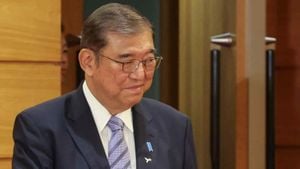With the dawn of the 2024 elections, the political arena is abuzz with excitement, particularly as former President Donald Trump assembles his team for another run at the White House. The stakes are high, and Trump is making strategic appointments, including notable figures from Georgia to key positions within his new administration.
Recently, Representative Elise Stefanik from New York, has accepted Trump’s nomination to become the next U.S. Ambassador to the United Nations. This announcement came shortly after she retained her Congressional seat. If confirmed by the Senate, she plans to resign from her position representing the North Country and officially start her new role on January 20, 2025, Trump's inauguration day.
Stefanik has long positioned herself as one of Trump's strongest allies, even referring to the U.N. as “antisemitic” for its stance on Israel. Her appointment signals a shift toward a more hardline approach at the U.N., emphasizing America’s interests over multilateral cooperation. She has suggested re-evaluations of U.S. funding to the UN, aligning with Trump’s inclination to withdraw from international agreements he believes are not beneficial to the United States.
Similarly, Trump has tapped former Arkansas governor Mike Huckabee as the next ambassador to Israel, underscoring his administration's commitment to pro-Israel policies. Huckabee, who has been vocal about his support for Israel, has articulated plans for U.S. engagement in Middle Eastern geopolitics. His nomination stands to reinforce the existing ties between the U.S. and Israel, especially amid rising tensions and conflicts within the region.
Trump’s choice of appointments reflects strategic decisions aiming to galvanize his base and re-establish connections with sectors of the electorate increasingly supportive of hardline policies. Huckabee's evangelical background and track record could appeal to conservative voters who prioritize Israel's security. His decision to host multi-national summits and engage directly with military and civilian leaders showcases his commitment to implementing policies aimed at promoting stability and growth in U.S.-Israel relations.
The transition period is set to last 75 days, during which Trump has to navigate the complexity of re-establishing his administration. With his allies and supporters at the forefront of his appointments, the process has often been characterized as more akin to favor-trading than traditional political maneuvering. Trump will need Senate confirmation for approximately 1,200 of these appointments, but gaining the upper hand with Republican control of the Senate may smooth the path.
Notably, these appointments come amid concern among some political analysts about the future of traditional governance rhetoric within the Trump administration. Critics have pointed out the lack of foreign policy experience among some nominees, including Stefanik, who many assert has minimal background beyond congressional committees.
Former U.S. Ambassador to the U.N. John Bolton acknowledged this, but also commented positively on her potential effectiveness.
Throughout her time in Congress, represented by various positions, including membership on the House Armed Services Committee, Stefanik has taken on roles involving issues of national security and global intelligence. Although she may not have directly crafted substantial foreign policy, her role on these committees has afforded her exposure to numerous international issues, providing her some level of preparation for her new role.
Stefanik has made headlines with her vocal stances on U.S. relations with various international players such as China, Russia, and Iran. Her reasserted commitment to Israel's cause has been notable, particularly concerning humanitarian allegations made against Israel by international bodies. At the heart of her remarks lies her philosophy of “America First,” which aims to prioritize U.S. interests over the demands often set forth by international agreements.
Just this week, it was reported by various sources, including The Independent, highlighting her challenges following Israel's controversial military actions post-October 7, 2023, when Hamas launched attacks. Many deaths, including those of civilians, have drawn international scrutiny, leaving Stefanik and her administration poised to navigate complex diplomatic waters. This week alone, the U.N. reported significant casualties resulting from the subsequent Israeli strikes, inciting debates on humanitarian and military ethics.
The current political climate is shaping up to be tumultuous with both domestic and foreign policy challenges on the horizon. Stefanik has indicated her intention to use the position as U.N. Ambassador to not only defend U.S. interests abroad but potentially to pursue actions deemed enforcing the narrative of peace through strength—a philosophy popular with conservative voters.
To add another layer to the administration’s transitions, Trump is also advancing initiatives to sidestep the Senate confirmation process where possible. Some nominees might be placed directly through recess appointments, allowing quicker access to power without lengthy customary confirmations. These tactics serve to help him swiftly set the tone of governance without prolonged political debates.
Comparatively, the ambitions of this upcoming administration parallel actions taken during Trump’s previous term, marked by controversial withdrawals from international organizations, including the U.N.’s Human Rights Council and the Iran Nuclear Agreement. His plans for the new term seem equally influenced by guarding U.S. sovereignty and skepticism toward multilateral alliances.
Stefanik's expected approaches at the U.N. may signal another wave of confrontational diplomacy, akin to Trump’s earlier tactics where he prioritized American sovereignty over diplomatic protocol. She has made clear her belief; “America continues to be the beacon of the world,” implying she would expect allies to reciprocate U.S. goodwill.
With just over 70 days till his inauguration, all eyes remain on Trump’s actions and on how he effectively restructures his team to align with his policies. Importantly, these new appointments are as much about ideology and coalition-building as they are about governance itself. The establishment of this coalition is not merely about outfitting the Cabinet but rather about recalibrated influence and setting the expectations for U.S. power on the global stage.
Trump's success during his first term was often attributed to his ability to access the base's sentiments, acknowledging their desire for swift action and strong leadership. It seems clear he is attempting to replicate this strategy, recycling past allies and building on their collective experience to craft his narrative for the new administration.
This newly minted administration has only just begun, yet the signs are all indicative of both continuity and evolution. If Trump’s past tenure serves as any reference point, we may expect brash, unabashed, and unapologetic engagement on both foreign and domestic fronts. Stefanik, along with Huckabee and others, embody this ambitious charge, setting forth to challenge existing paradigms and redefine America’s role both at home and abroad.



